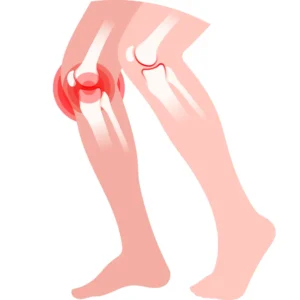- +91 782-7080-348
- contact@neemtreehealthcare.com
- A290 2nd Floor, Defence Colony ND-110024
- +91 782-7080-348
- contact@neemtreehealthcare.com
- A290 2nd Floor, Defence Colony ND-110024
Latest post
Post Categories
- No categories

Book Your Appointment
ACL Reconstruction
Exploring Modern Advancements in ACL Reconstruction Procedures
15+
Centres in 7 States/UTs
50+
Expert Surgeons
2000+
Joints Replacements
60000+
Happy Patient
Types of Hip Pain
Hip pain refers to any type of pain in or near the hip joint caused by various factors such as an injury, wear and tear, or an underlying medical condition. Hip pain can be felt in different parts of the hip joint and can be described as a dull ache or sharp pain. Understanding the types of hip pain can help you identify the cause and seek appropriate treatment.
Hip joint pain is often caused by osteoarthritis, Avascular necrosis of hip, rheumatoid arthritis, or hip fractures. Several other things, like muscle strain, tendinitis, or an underlying medical condition, can contribute to it.The hip joint is the body7apos;s biggest ball-and-socket joint and is crucial for mobility. The hip joint pain can be felt in the groin, thigh, or buttock.
Lower back and hip pain is a type of pain that is often caused by muscle strain or injury. The pain can be felt in the lower back and hip and can be described as a dull ache or sharp pain. This type of pain can be relieved with rest, physical therapy, and over-the-counter pain medications.
Trochanteric bursitis, also known as Greater trochanter pain syndrome is a type of hip pain that is caused by inflammation of the bursa, a small fluid-filled sac near the greater trochanter. On the outside of the thigh bone, there is a large, twisted quadrilateral crest known as the greater trochanter. This type of hip pain can be felt on the side of the hip.
Back hip pain is a type of hip pain that is caused by problems with the lower back. This type of pain can be felt in the hip and lower back and can be described as a dull ache or sharp pain. Back hip pain can be caused by factors such as muscle strain, herniated discs, or spinal stenosis.
Hip bone pain is a type of hip pain that is caused by problems with the hip bone. This type of pain can be felt in the hip and can be described as a dull ache or sharp pain. Hip bone pain can be caused by a range of factors such as bone fractures, osteoporosis, or cancer.
Understanding the types of hip pain can help you identify the cause and seek appropriate treatment. If you’re experiencing persistent hip pain, it’s important to seek medical attention to prevent further complications. Treatment for hip pain may include rest, physical therapy, over-the-counter pain medications, or surgery. Maintaining a healthy weight, engaging in regular exercise, and practicing good posture can help prevent hip pain.
Hip Pain Treatment
Hip pain can significantly impact one’s quality of life, making it essential to seek proper treatment. There are several treatments available, depending on the origin and seriousness of the hip pain.
Hip bursitis treatment
Inflammation of the bursae, which are tiny, fluid-filled sacs that cushion the bones, tendons, and muscles close to the hip joint, is referred to as hip bursitis. Treatment for hip bursitis typically involves rest, ice, and nonsteroidal anti-inflammatory drugs (NSAIDs) to reduce pain and inflammation. Physical therapy and corticosteroid injections may also be recommended.
Hip joint effusion treatment
Hip joint effusion occurs when excess fluid builds up in the hip joint. Treatment usually involves rest, ice, compression, and elevation of the affected leg to reduce pain and inflammation. NSAIDs and corticosteroid injections may also be recommended to reduce pain and inflammation.
Avascular necrosis (AVN) hip treatment
Avascular necrosis (AVN) is a condition that occurs when the blood supply to the hip bone is disrupted, leading to bone death. Treatment for AVN typically involves pain management with NSAIDs and prescription pain medications. In some cases, surgery may be necessary, such as core decompression surgery to relieve pressure on the bone or total hip replacement.
Total Hip Replacement (THR) is a surgical procedure that involves replacing the damaged or diseased hip joint with an artificial joint. This procedure is typically recommended for individuals with severe hip pain and mobility issues that cannot be effectively managed with other treatments. THR can provide significant pain relief and improved mobility.
Choosing the right hip replacement surgeon is crucial to ensuring the success of the procedure. It’s important to choose a surgeon with plenty of expertise doing hip replacement procedures and a strong track record of positive results. You might also want to take the surgeon’s mannerisms, bedside demeanor, and overall patient experience into account.
Hip pain can significantly impact one’s quality of life, but there are various treatment options available depending on the cause and severity of the pain. Treatment options range from conservative measures such as rest and physical therapy to more invasive procedures like total hip replacement or partial hip replacement surgery. It’s important to consult a qualified orthopedic doctor to determine the best treatment for your specific needs. If you are experiencing hip pain, book a free online consultation on our website to discuss your options and develop a customized treatment plan.
Our Specialties
Our Centers
Why Choose NeemTree Healthcare?
50+ Specialist Onbaord
40+ Years of Experience
24X7 Medical Assistance
All Govt Panels Accepted
EMI Option Available
Post Discharge Home Care
Medical Visa Assistance
PSUs & TPA Insurances Accepted
NeemTree Healthcare
Your Trustable Orthopedic Solution
- Post-surgery care – We tend to offer fantastic follow-up sessions, including consultations and instructions like dietary tips and physiotherapy to all patients to ensure you have a seamless recovery.
- Home Care including change of dressing, stitch removal and physiotherapy sessions at home.

Meet The Happy Patient
Our Experienced Doctors
Our proficient team of skilled and best shoulder replacement specialists provide best-in-class treatment to ensure pain relief, improved mobility and a better quality of life. Our compassionate and immensely experienced panel of shoulder replacement specialists doctors/surgeons adhere to world-class technology for innovative care and seamless assistance for your speedy recovery.







FAQ
Sciatica, a condition where the sciatic nerve, which runs from the lower back to the hips and down each leg, is compressed or irritated, frequently causes hip pain that radiates down the leg. Other potential causes of hip pain that radiates down the leg include hip joint problems, such as osteoarthritis, bursitis, and labral tears, as well as spinal issues like herniated discs and spinal stenosis. You should consult a doctor for an accurate diagnosis and appropriate treatment.
The best way to relieve hip pain depends on the cause of the pain. Relaxation and refraining from aggravating activities can be beneficial. Applying ice or heat, taking over-the-counter pain medications, and performing gentle stretches and exercises can also provide relief. Physical therapy, acupuncture, and massage may also be beneficial for some people.
Relieving hip pain while sleeping can be challenging, but there are a few options that can help. One approach is to try sleeping in a different position, such as on the back with a pillow under the knees or on the side with a pillow between the legs. It can help to reduce pressure on the hips and ease pain. Moreover, using a firm mattress or a mattress topper designed for people with hip pain can provide extra support and cushioning. Over-the-counter pain medications and applying heat or cold therapy before bed may also be helpful. If the pain persists, it is important to consult an orthopedic doctor for further evaluation and treatment.
For lower back and hip pain, the first doctor to see is usually someone who specializes in spine and hip. They can evaluate the pain, provide basic treatment, and refer to a specialist if needed. A person can be referred to a physical therapist, a chiropractor, or a neurologist depending on the source of the pain. In some cases, imaging tests or other diagnostic procedures may be necessary to accurately diagnose and treat the pain.
Many factors might cause hip pain, such as injury, inflammation, wear and tear, or underlying medical conditions. Common causes of hip pain include osteoarthritis, bursitis, tendinitis, muscle strain, hip fractures, and hip impingement. Furthermore, pain from lower back problems or nerve issues can also cause hip pain. Maintaining good posture, staying active, and avoiding prolonged sitting can help prevent hip pain.
There are several ways to reduce hip pain, including rest, ice or heat therapy, over-the-counter pain medications, gentle stretching and exercise, physical therapy, and weight loss. For more severe hip pain, corticosteroid injections or surgery may occasionally be required. To identify the underlying cause of hip pain and create an effective treatment strategy, it’s important to consult an orthopedic physician.
Unnatural spinal alignment and greater pressure on your hips might result from sinking too deeply into a mattress that is too soft. On the other side, a mattress that is overly firm might lead to increased hip pressure and inadequate spinal support. To avoid back and hip pain, it’s imperative to pick a mattress that provides the right support and alignment for your body type and preferred sleeping position.
Yes, hip bursitis can cause pain that radiates down the leg. The trochanteric bursa is located on the outside of the hip and when inflamed, can cause pain that radiates down the outside of the thigh, knee, and even to the ankle. This pain is often described as a shooting or burning sensation and can be aggravated by activities such as walking, running, or climbing stairs. You should consult an orthopedic doctor if you are experiencing persistent hip pain to determine the cause and appropriate treatment.
A meniscus tear typically causes pain in the knee joint, but it is possible for the pain to radiate to other areas, including the hip. However, hip pain caused by a meniscus tear is not very common. If you are experiencing hip pain along with knee pain, it is recommended to consult a doctor for an accurate diagnosis.
